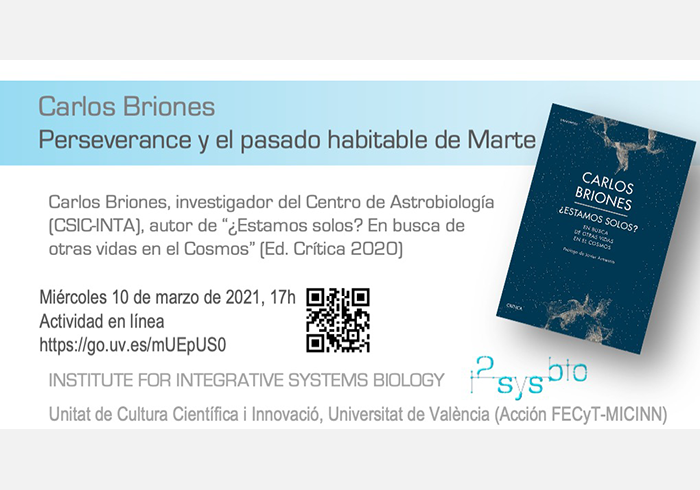Users
Social media
- More details here...
- Address
Parc Científic de la Universitat de València C/
Catedrático Agustín Escardino, 9
46980 Paterna (Valencia) Spain - Email:
iu.i2sysbio@uv.es - Phone:
(+34) 963544810
- Address
Links
Carlos Briones takes us to Mars

Investigation
Carlos Briones takes us to Mars

The Perseverance rover arrived at the Jezero crater on the planet Mars on February 18. Its main mission is to search for fossil remains of possible microbial Martian life. Next Wednesday, March 10 at 5 p.m., Carlos Briones, from the Astrobiology Center (CAB, CSIC-INTA), will explain the characteristics of the mission, the technological and scientific challenges it entails and will help us reflect on what cultural impact finding life outside of Earth can have.
The impressive images of the arrival of the NASA Perseverance rover to Mars are the prelude to one of the most fascinating adventures ever undertaken on the red planet. It can be said that the Perseverance mission is eminently astrobiological. Described by some as the most sophisticated geochemical robot in history, it will analyze samples of the Martian subsoil in search of fossil remains of hypothetical Martian life from the past, billions of years ago. In its infancy, the planet Mars was similar to the early Earth and may have hosted the same type of abiotic chemistry processes that led to the emergence of terrestrial life. The information collected by Perseverance about the planet's current geology and climate will also be essential in the design of future manned missions. In addition, a part of the samples collected will be saved so that they can later be taken to Earth by joint NASA-ESA missions. The discovery of remains of microbial life on Mars would be one of the greatest scientific discoveries in human history.
Carlos Briones is a CSIC researcher at the CAB Center (joint CSIC-INTA center associated with the NASA space agency) interested in the origin of life, the evolution of viruses and the development of biosensors to search for remains of life on Earth and on other planets. Briones carries out intense dissemination activity through social networks, conferences, collaboration with the media and the publication of books. The most recent is "Are we alone? In search of other lives in the Cosmos" (Critical Ed., 2020) where it explores the past, present and future of the search for life in the universe and the cultural derivatives of this obsession reflected in literature, cinema or art. Also the author of fiction and poetry stories, the work of Carlos Briones is a notable example of the integration of science, the humanities and the arts.
The activity can be followed online on Wednesday, March 10 starting at 5 p.m.


